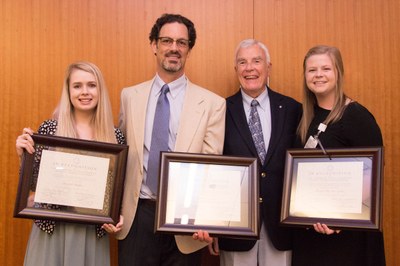Summer Oncology Nursing Fellowship Program Supports Undergraduate Students
By Ashley Leak Bryant, PhD, RN-BC, OCN®, and Susie Mason, MSN, RN, OCN®

As the number of cancer survivors continues to increase, more oncology-trained nurses are needed to care for this population. Unfortunately, not all schools of nursing have clinical experiences in the oncology setting. However, the University of North Carolina (UNC) leadership is committed to increasing the pipeline of students interested in caring for patients with cancer and their families through an innovative summer fellowship program.
At North Carolina Cancer Hospital, we’ve collaborated to provide unique and comprehensive fellowship experiences for prelicensure nursing students with an interest in oncology nursing. The fellowship offers students a range of experiences in inpatient, ambulatory, and palliative care.

On average, 10 students apply annually for two to three competitively selected summer fellowship positions. Those not selected are sent a letter encouraging them to join ONS as a student, attend local ONS meetings, and meet with the oncology nursing faculty. All applicants are strongly encouraged to consider a nursing assistant position in the cancer hospital.
How the Fellowship Works
Students spend six weeks participating in varied inpatient, ambulatory care, and palliative care experiences (see sidebar). They’re exposed to a full spectrum of an oncology nurse’s role and responsibility, and they have the opportunity to spend a day shadowing in an area of personal interest. Some of the past fellows have pursued pediatric oncology, outpatient hospice, inpatient palliative care, and patient advocacy.

At the end of the fellowship, students present an evidence-based project based on their interest and how they used their experiences to the cancer center’s leadership and staff. Students also have the opportunity to thank their preceptors, cancer center leadership, and donors. They receive feedback as they continue to pursue the project during their senior year as an honors thesis, allowing for further development and connection to oncology nursing.
Stories of Success
Since 2016, eight students have completed the fellowship, and a new cohort of four students is scheduled to begin in summer 2019. Most of the nurses now work in oncology or hospice nursing. Students have shared that they appreciated having more opportunities to practice clinical skills, therapeutic communication, patient advocacy, and interprofessional communication.

Past fellows have strongly recommended that future nursing students take advantage of similar fellowships, shadowing opportunities, and membership in professional organizations that match their passions. We remain in contact with our previous nurse fellows, and it is our personal interest to determine if they pursue oncology nursing, become certified, or enroll in graduate school. We’ve found that the fellowship is one strategy to heighten awareness of the important role of oncology nurses and engage nursing students in specialty nursing careers.
The authors acknowledge the following donors for their support of the program: Fred Flynn, Jr., in memory of Susan D. Flynn; Bob Lauterborn in memory of Sylvia Lauterborn; UNC Lineberger Comprehensive Cancer Center, North Carolina Cancer Hospital, and the UNC School of Nursing. Thanks to Deborah Mayer, PhD, RN, AOCN®, FAAN, Claire Gillet, MSN, RN, OCN®, and the nurse managers of the North Carolina Cancer Hospital in supporting the fellowship.
